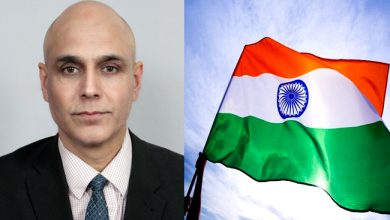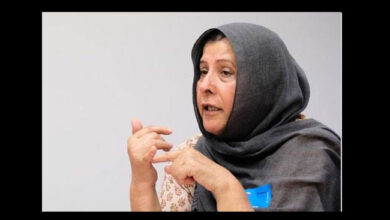Kashmir and the Administration of Justice

(Third part of three-part article series)
Dr. Ghulam Nabi Fai Chairman
World Forum for Peace & Justice January 28, 2024
Professor Zafar Khan, Head of Diplomatic Department of JKLF and a well-known leader of Kashmiri global diaspora has said, “Kashmiris are denied their collective and individual rights by India. The political, judicial and security establishment in India has orchestrated an environment of fear and impunity across Jammu Kashmir. With thousands of civilian deaths, politically motivated trials of Kashmiri leaders, India shows scant respect for domestic and international law. Yasin Malik’s trial to convert his deeply flawed life sentence to death, is a glaring example of this impunity. It has to be said that recourse to justice for Kashmiris after annexation of disputed Jammu Kashmir, is no longer a basic right for them.”
Human Rights Watch in its World Report 2023 (India) writes, “Allegations of torture and extrajudicial killings persisted, with the National Human Rights Commission registering 147 deaths in police custody, 1,882 deaths in judicial custody, and 119 alleged extrajudicial killings in the first nine months in 2022.
Amnesty International says, “Torture and other ill-treatment of detainees in police custody remain widespread.” According to Amnesty International, these broadly defined powers facilitate the shooting of the suspects in custody. Amnesty International calls PSA as ‘Lawless Law.’
Many members of the United Nations Human Rights Council, Asian Federation Against Involuntary Disappearances, International Commission of Jurists, and other international NGO’s have expressed concern that these provisions contravene the right to life provided in the International Covenant on Civil and Political Rights (ICCPR).
Dr. Farhan Mujahid Chak, Canadian-Kashmiri scholars and widely respected expert on the subject of Kashmir has said, ‘The justice system in the disputed territory of Jammu and Kashmir is as artificial as its current governance structure. No bearing with the reality on the ground and as illegitimate as any settler-colonial power would be anywhere in the world.’ The laws weaponized in the disputed territory are not meant to protect the powerless against the powerful or establish justice. They operate to perpetuate the illegal stranglehold India has over society.
The 43- pages report on the ‘Situation in Kashmir’ by the Office of UN High Commissioner for Human Rights (UNHCHR) issued on June 14, 2018 has noted that , “Special laws in force in the state, such as the Armed Forces (Jammu and Kashmir) Special Powers Act, 1990 (AFSPA) and the Jammu and Kashmir Public Safety Act, 1978 (PSA) , have created structures that obstruct the normal course of law, impede accountability and jeopardize the right to remedy for victims of human rights violations. AFSPA grants broad powers to the security forces operating in Jammu and Kashmir and effectively bestows immunity from prosecution in civilian courts for their conduct by requiring the central government to sanction all prospective prosecutions against such personnel prior to being launched.”
An incarcerated but eminent and internationally known human rights activist, Khurram Parvez echoes those sentiments in 549-pages report on, ’Torture: Indian State’s Instrument of Control in Indian Administered Jammu and Kashmir’ on page 104, “In the context of unprecedented militarization in the state of Jammu and Kashmir post 1989, the army is omnipresent in all the villages and towns of the Kashmir Valley. Following the Doctrine of Sub-Conventional warfare (breaking the will of the people), the armed forces have perpetrated inter alia massive torture in the state of Jammu and Kashmir, they are equipped with legal, political, and moral impunity. Despite possessing some powers, the judiciary is avoiding confronting the executive, resulting in an overall state of judicial impunity.”
United States, Department of State Country Report 2022 states that “The Public Safety Act (PSA), which applies only in Jammu and Kashmir, permits authorities to detain persons without charge or judicial review for up to two years without visitation from family members. In April, the press reported that more than 500 persons remained in detention under the PSA in Jammu and Kashmir.”
Country report further adds, “There were reports that police beatings of prisoners resulted in custodial deaths (see section 1.a.). There were reports of abuse in prisons by guards and inmates, as well as reports of rape of detainees by police. According to human rights NGOs, police used torture, other mistreatment, and arbitrary detention to obtain forced or false confessions. In some cases, police reportedly held suspects without registering their arrests and denied detainees sufficient food and water.”
Advocate Jalil Andrabi has said that “the laws conferring unrestricted and arbitrary powers on the armed forces continue to remain in operation in Jammu & Kashmir, with full impunity to the perpetrators or crimes against the humanity and violations of fundamental human rights, threatening the very existence of the people of Kashmir. Indictments and appeals from the United Nations Rapporteurs on Torture; Extrajudicial, summary or arbitrary execution; freedom of opinion and expression; situation of human rights defenders; Independence of judges and lawyers; Freedom of religion and belief; Violence against women; International Commission of Jurists; Amnesty International; Human Rights Watch have failed to make India to withdraw these laws.”
The arbitrary powers conferred upon the armed forces with virtual impunity from any legal action, are a part of deliberate Indian State policy wherein, arbitrary arrest, detention, torture, extra-judicial killing, killings of civilians and unarmed and peaceful demonstrators have been used as a weapon of war. The motive behind these crimes against humanity is to force the Kashmiri people to abandon their struggle for fundamental human rights of self-determination.
The problems associated with attempting to curtail human rights abuses in Kashmir are further complicated by India’s steadfast refusal to allow non-governmental organizations, the United Nations Thematic Special Rapporteurs, Amnesty International and other NGO’s to investigate allegations in Kashmir.
UNHCHR has recommended to the Government of India in its report on page # 48 that “In line with its standing invitation to the Special Procedures, accept the invitation requests of the almost 20 mandates that have made such requests; in particular, accept the request of the Working Group on Enforced or Involuntary Disappearances and facilitate its visit to India, including to Jammu and Kashmir.” It has also recommended to the UN Human rights Council to, “Consider the findings of this report, including the possible establishment of a commission of inquiry to conduct a comprehensive independent international investigation into allegations of human rights violations in Kashmir.”
In reality, as Advocate Jalil Andrabi has said the people of Kashmir are prisoners – prisoners of their conscience. They have been deprived of their non-derogable human rights including their right to life and liberty, and access to justice only because they are demanding to exercise their fundamental inalienable and non-derogable right to self-determination. In order to restore the basic human rights of the detainee, it is necessary that India is compelled to concede the right of the people to exercise their self-determination and stop its crimes against humanity in Kashmir.
With these words I have shown the merest tip of the iceberg of the pandemic violations of human rights with which the people of Kashmir must live on a day-to-day basis. Such events are not rare and occasional, but most decidedly part of a systematic policy of repression, victimization, suppression, and colonization. By extension, one has to ask what extremely deleterious effects this activity must have on the psychological health of even the occupying forces, and on the families and neighbors of all those affected by such violence.
By virtue of our shared humanity, we are obliged not to sit idly by, but to act swiftly and surely to repair the disastrous human chaos that daily threatens human life and human dignity of the people of Kashmir. The question arises: what should be the point of departure for determining a just and lasting basis? The answer obviously is (a) the Charter of the United Nations and (b) the international agreements between India and Pakistan.
(Concluded)





